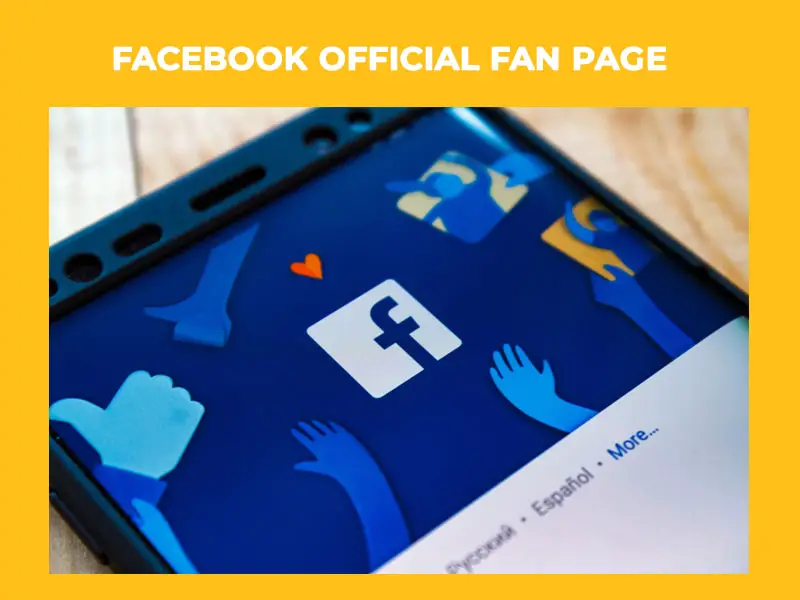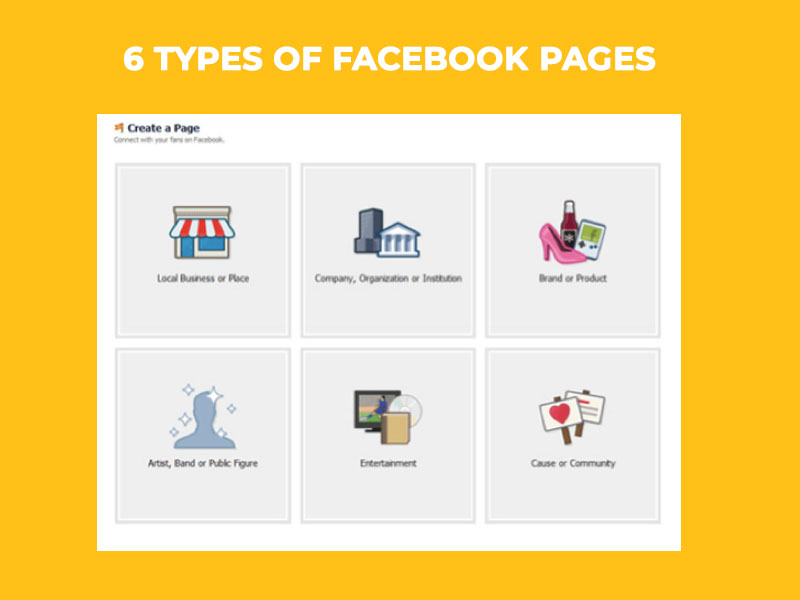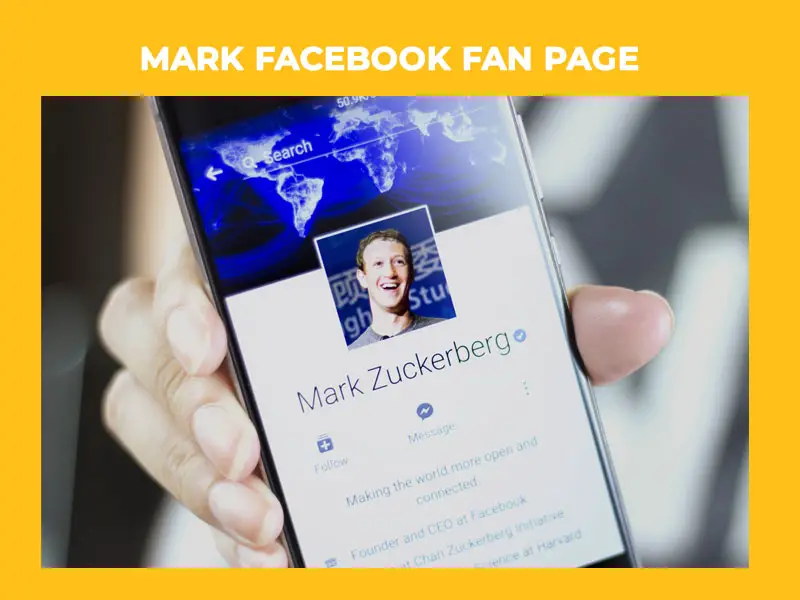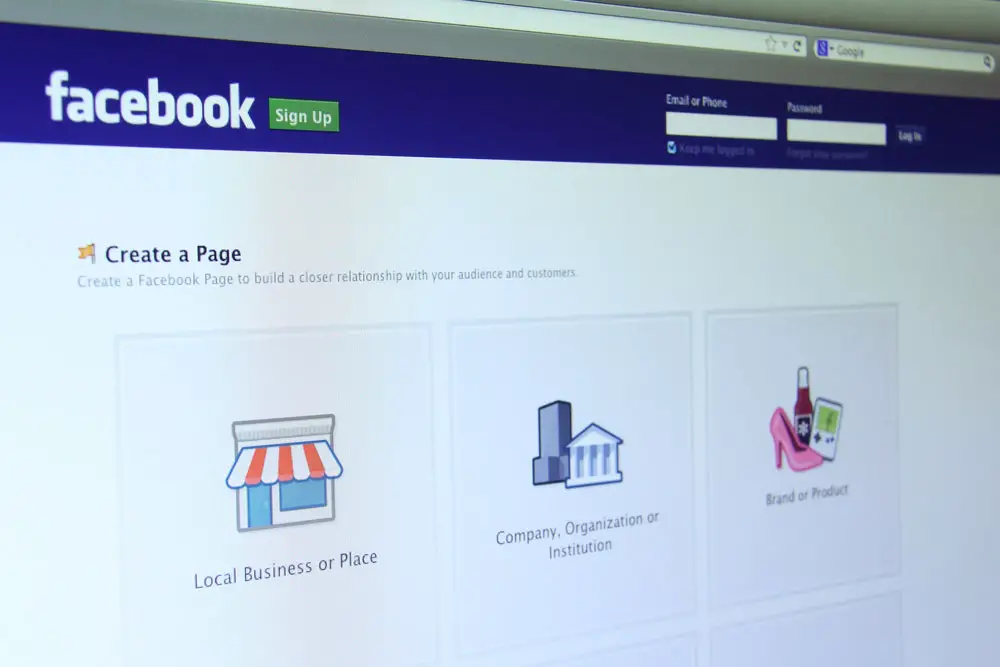Do you know how many types of Facebook Pages there are? And which one is the most trending among all of them? Let’s find out in this article.
Facebook is an amazing tool that lets you interact with others and increase the reach of your business to hundreds and millions of potential users. Facebook page categories will help you reach your goal.
Creating a Facebook page has many benefits. For companies, it will help potential customers find your offer more quickly. This article will find out what categories are on Facebook and how to use the right category. Deciding is easy and fast!
How to create a Facebook business page
Step 1: To create a Facebook business page, you must have a personal account. If you already have one, click “+” in the top panel and select “Page”“.
Step 2: Next, we’ll define the category where we’ll open the Company page. To do this, select the purpose for which the page was created. Select “Business or Brand” for a company.
Step 3: In the popup window, enter the page name and category. We will indicate contact information: city, address, postal code, and telephone number. The page is empty at the beginning. For later work, it is necessary to fill in the information. You have created a page. Facebook will automatically publish it.
Step 4
To start designing the page:
- Upload the cover. This image should be 851×315.
- Click “Add cover”, and select an image.
- Arrange how you want and save.
If you want to be creative but lack ideas, you can check out other communities or get templates from Crello or Canva.
Step 5: A profile photo will be included with all comments and posts. It must be chosen carefully so that it attracts the interest of new clients and identifies the users of this group.
Step 6: The form includes a website address and a brief description. This detail will help the visitor understand what your page is about
Step 7: Facebook has an interesting button to add features. Its configuration depends on when you want to click to view: Contact, buy, play, and download applications, among others.
So click and select the action you selected. Point to the same link to redirect the action and save.

Types of Facebook Pages & Facebook category list
Below, we take a look at the Facebook categories you can select for your Facebook page. This will allow you to determine the direction of your business.
- Suitable for companies providing advertising/marketing services.
- Agriculture. This category is suitable for a variety of farms as well as agricultural services and cooperatives.
- Art and Entertainment. This category is suitable for different entertainment venues: from races to circuses and museums.
- Cars, planes, and boats. The category is suitable for both car dealers and equipment repair companies.
- Beauty, cosmetics, and personal care. Use this category if you provide beauty services.
- Commercial and industrial. Category for companies dedicated to the production or sale of products.
- Education. Category for companies that provide school, education, or other services. Also suitable for academic tutors and consultants.
- Banking/finance. Category for many businesses in the financial banking and financial sector.
- Eating and drinking. If your main activity is food and beverages, choose this category.
- Accommodation / Hotel. A category for merchants who offer their clients various places to stay: from camps to hotels.
- Legal. The category is suitable for lawyers and notaries.
- Media / News. The category is suitable for creators of a variety of information products and services.
- Medicine and health. This category includes professionals in private practice and medical centers who offer related services.
- Non-profit organization. This category includes organizations created not just for profit (religious, educational, and scientific purposes).
- Public and public service. This page is required for any library, child protection service, passport service, or car registration center.
- Real estate. The real estate category is suitable for businesses that provide property services.
- Science, technology, and engineering. For companies that provide high-tech services in the fields of robotics, engineering, aerospace, and solar energy.
- Shopping. A category for all types of retailers/e-commerce.
- Sport. Category for sports and leisure gym, leisure venues, stadiums, go-kart tracks etc.
- Travel and transportation. The category is suitable for both travel agencies and bus stations or taxi services.
Business categories on Instagram
There are also Instagram business categories. This social network includes algorithms that choose the label that suits your profile. The complete list is extensive. We will give you the most common categories:
- Restaurant
- Personal blog
- Public figure
- Musician / Band
- Service products
- Art
- Gym. There are also various subcategories such as fitness model or trainer
- Local company or service
- Government Employee
- Political
- Political candidate
- Actors and other artists. You are also listed in this category as “Artist.”
- Producer
- TV presenter
- Photographer
- Dancer
- Web designers and other types of designers
- Instructor
- Journalist. Editor
- Concert tour
- Model Fashion designer.
- Encouraging speaker
- Movie character
- Scientific
- Comedian
- About the site … – Change your spin. For example, there is a “home and garden site”, etc.
- An interesting and relatively common type is “for fun”.
How Category Affects Businesses
Choosing the right category when setting up your Facebook page is a very delicate task. It is also quite important to make sure that the people who come to your page instantly understand what it is about.
The choice will directly affect how your target audience interacts with your business page. If you rank your page incorrectly, your target audience may not find your offer quickly.
To improve your knowledge, answer the following questions:
- What target audience are you trying to reach?
- How far can you represent your business?
- What features of Facebook will help you grow your business more efficiently?
- What kind of use do your competitors use on Facebook?
The answers to these questions will help you decide which Facebook category is right for your business.

4 Trending Types of Facebook Pages
If you don’t get the category right for the first time, don’t worry. Understanding your time and settings is essential to improving a Facebook page. You can change the page type at any time you need, but be aware that doing so may result in loss of information. Here are the current Facebook categories that you can choose from.
1. Local business or place
The widest and most popular option. By selecting this, you will see a short form to fill out.
You can add the following information.
- The title of the page matches your company name.
- This page can range from “cars, planes, and boats” to “karting”. You have the opportunity to choose your choice with different features.
- Your business email address. Make sure you explain it correctly. If you have a large company, add the address of the local branch.
- The city where your business is located. Facebook can automatically fill your profile based on its location. However, you can change it if necessary.
- City and state of your business. Facebook will automatically fill in your profile depending on its location or the space used to create the page, but you can change them if necessary.
- Your business zip code. Same with city and state, Facebook will fill up automatically, but you can change that.
- Ensure your company’s phone number is open to the public, which users can use to find out more. If it is a branch, be sure to point it out.
As far as the category is concerned, you are allowed up to three. Facebook will eliminate duplicate categories. The social network algorithm is based on specific points. You don’t have to search for three categories, so if you can’t think of three categories to run your business, that’s fine. Choose people who need to cover what your business has to offer.
2. Company, organization, or institution
This category, like the others, has a drop-down list instead of a text box to fill out. After selecting this category, Facebook will ask for your business name and category. You will have a complete list of options to choose from.
3. Brand or product
Like the previous categories here, you will be asked to enter your brand or product name and select a category.
Be prepared for new recommendations or requirements when choosing some of them.
For example, if you choose pharmaceuticals, Facebook may need your permission before creating a page or running ads. Online pharmacies are generally not allowed to use the Facebook ad program – but it depends.
Requirements have also been made for companies selling alcoholic beverages. You will need to adjust the target age parameters for your page. It can hide you from certain groups of people.
Don’t try to fool the system – some posts and scams will be exposed.
4. Artist band or public existence
You can have a personal branding page and personal profile at the same time. Some politicians and celebrities may have a Facebook page that they use to chat with their family and friends and a public page so that everyone can share their thoughts and promote ideas.
We suggest that you select this Facebook category if nothing else suits you. There are a number of types that are involved in this process. For example, anyone who writes content can be a blogger, author, or author.
Which do you choose? If you write primarily for a blog, “Blogger” would be a great option. The “author” is better if you write mainly novels or biographies. If it doesn’t fit into any of these categories, then “author” is a good idea.

Facebook pages and benefits for businesses
First of all, the question arises as to what advantages a Facebook fan page brings for businesses and what disadvantages it is associated with at the same time.
Advantages of a Facebook fan page
The advantages affect all areas of the company. Most of the effects can be found in marketing, which in turn becomes fundamental for other areas.
It is possible to quickly create a fan page without any technical hurdles. As a result, companies can be found internationally and build up a social media presence. Nowadays, being active on social networks is essential to achieve a high reach: because this can increase brand awareness. The proximity to target groups enables direct addressing and offers short paths to networking:
- Companies get direct feedback from the target audience: be it on new developments and news or on the existing product portfolio.
- Businesses can respond immediately to events of public interest.
- Company messages can resonate widely and go viral.
- All of this leads to trust in the company being created and attention being drawn to the actual website of the company. Based on the extensive analysis options and statistics that Facebook fan pages offer, objectives can be optimized and the possibility of increased sales or new business could arise.
Disadvantages of a Facebook fan page
However, operating Facebook fan pages also has its downsides. It takes a lot of time and effort for companies to reap the benefits. A fan page requires regular content generation and interaction with “fans”. This is time-consuming and requires a certain level of professionalism so that customers are addressed by published articles.
If the fan page does not provide any content, there is a risk of so-called “orphaned fan pages” where a post was last posted three years ago, for example. This, in turn, gives the wrong impression as social media users’ attention and “following” is only maintained when you share up-to-date and regular content.
In addition, disgruntled customers could become a nightmare for companies. Dissatisfied customers can see fan pages as an opportunity to share their negative experiences and relieve themselves of their frustration. In such cases, companies must endeavor to protect their image, for example by regularly checking the page and responding appropriately to such customer contributions.
Importance for search engine optimization
As far as search engine optimization is concerned, “likes” and interactions can influence search engine rankings (so-called social SEO). Even if this view is controversial, it is still hoped that it will have a positive effect. At the very least, it is believed that it has an indirect positive effect on SEO for companies.
Another importance is that search engine optimization is also relevant to the fan page itself. The most important keywords that should be ranked can be placed in the title of the page or in the notification area. It is also important here that status updates stimulate interaction with fans.
How many Facebook Pages can I create?
Facebook Community Standards allow you to use only one personal account. Through this, you can create and manage multiple pages for companies, products, brands, or products. The administration of the pages can in turn be done from different accounts.
Requirements for creating a Facebook Page
To create a Facebook Business Page, you must first create a personal profile if you don’t already have one. You will also be given the administration rights to create and maintain the company page and create additional Facebook team members. You must also be authorized by your institution to set up and maintain the organization’s official Facebook page.
Preliminary considerations for your own Facebook page
For many, social networks are part of public relations work. But it is still worth considering in advance whether a Facebook page makes sense for your own business. There is a lot to consider: Facebook user numbers are stagnating, maintenance can take a lot of work and Facebook is happy to be paid to optimize your reach.
Creating a Facebook Page is actually free. By creating the page, you agree to the terms of use for Facebook pages, which must be observed. For the detailed Facebook Terms of Use, please click on the link above. Here is a (very) small excerpt:
- An organization’s Facebook page must be managed only by an authorized representative of that organization, as this Facebook profile is an “official” company page.
- The page name and Facebook web address must correctly and accurately reflect the page content.
Page names must meet the following requirements:
They cannot only consist of general terms (e.g. “beer” or “pizza”).
They must be correct and grammatically correct. Exceptions: acronyms, such as B. “EKD”.
They must not contain superfluous descriptions.
What distinguishes Facebook Pages?
A page is created by a profile and is explicitly intended for commercial use. The profile that created the page owns the page. However, other users can work on a page. Facebook provides a role system for this purpose.
A special case is the use of a Business manager: Private and business use of Facebook can be separated here. The business manager is then the owner of the page. Company employees no longer appear as a profile on the site.
Which features are still important?
- Page posts are always public, but audiences can be set.
- Pages are found in search engines and the content can also be viewed when you are logged out.
- Pages may create advertisements.
- There is no limit to the number of fans.
- Additional fields and functions are available: contact, links, location, visits, ratings, etc.
- Page posts can be scheduled.
- Extensive statistics are available.
- An imprint obligation applies.
Profiles as a complement to the Facebook page
Even if predominantly a commercial use of the profile is not always advised, you can also use your profile for business purposes within certain limits or at least refer to your company.
Where exactly the limit for business use lies is not clearly defined. Therefore, you should not overdo it with the promotion of your company.
By the way, if you have used your profile extremely for business purposes, you can also convert it into a page. Your friends will then become fans. However, you should communicate such a measure well in advance.
Here are our recommendations for using your profile professionally:
No fake profiles
Even if you only use your profile to create a page and are not otherwise active on Facebook, you should absolutely avoid fake profiles. If you are blocked, you risk that your site will also be gone. Therefore: Use your real name! You can set the rest of the profile so that it is not publicly visible.
Friend request strategy
On Facebook, there will come a time when you will receive friend requests from people who want to contact you on business. There are really only two strategies here:
You use Facebook purely privately and consistently reject such requests. It is best to send a message with a short explanation and a link to your site or other contact platforms
You mix private and business inquiries. Then you should work consistently with friend lists.
What does a Facebook page do for you?
The famous “Like”. If you got a “Like” from someone, you can be happy. Your Facebook page gained a fan. Someone who likes your company or brand and doesn’t want to miss any news from your business. By the way, the total number of likes is displayed publicly.
If you feel you don’t have enough fans, talk to us. Under no circumstances should you buy cheap fans anywhere on the Internet!
Direct communication
One of the main reasons for having a fan page on Facebook is direct communication with your target audience in an easy and seamless way. You have the opportunity to enter into a direct dialogue with your fans. Conversate directly and respond to comments in real time.
Customer retention
With a Facebook page, you improve your chances of retaining your customers and building customer relations. But first, you have to build trust. You can work this out with a lot of patience and the direct communication mentioned above.
Advertising opportunities
You have the option of placing advertising on your fan page. And it’s also target audience-oriented. So you can define who should see the ad. Age, educational qualifications, married or not.
Local businesses on Facebook can be rated in many cases. Stars are given from one to five, and Facebook users are also given the opportunity to add something. So if you have predominantly positive feedback, it pays off. From time to time there can be bad reviews – it happens.
Managing Your Facebook Page
Once your Facebook Page is set up, it’s time to start managing it. This involves posting content, responding to comments and messages, and using Facebook Insights to track your Page’s performance.
Facebook Insights is a powerful tool that provides valuable insights into your Page’s audience and performance. It allows you to track metrics such as reach, engagement, and audience demographics, helping you understand what content is resonating with your audience and what needs to be improved.
Posting content on your Facebook Page is a key part of building and maintaining an engaged audience. This can include text updates, photos, videos, and other forms of media. It’s important to strike a balance between promotional content and more engaging content, such as behind-the-scenes looks at your business or organization.
Responding to comments and messages from your audience is an essential part of managing your Facebook Page. This helps build relationships with your audience and create a sense of community around your Page. Responding promptly and professionally to comments and messages can help foster a positive reputation for your business or organization.
Growing Your Facebook Page Audience
Growing your Facebook Page audience is a crucial aspect of using Facebook for business or organizational purposes. The larger your audience, the more potential customers or supporters you can reach.
One effective way to grow your Facebook Page audience is to promote your Page. This can involve sharing your Page with your personal network, adding a link to your Page on your website or other marketing materials, or using Facebook advertising to reach a wider audience.
Engaging with your audience is another important aspect of growing your Facebook Page. This involves responding to comments and messages, asking for feedback, and encouraging your audience to share your content. The more you engage with your audience, the more likely they are to become loyal followers and share your Page with others.
Collaborating with other pages and groups can also help grow your Facebook Page audience. This involves partnering with other businesses or organizations that have similar audiences, cross-promoting each other’s Pages, and participating in joint events or initiatives.
By combining these strategies, you can effectively grow your Facebook Page audience and reach a wider audience with your business or organizational messages.
Growing Your Facebook Page Audience
Growing your Facebook Page audience is a crucial aspect of using Facebook for business or organizational purposes. The larger your audience, the more potential customers or supporters you can reach.
One effective way to grow your Facebook Page audience is to promote your Page. This can involve sharing your Page with your personal network, adding a link to your Page on your website or other marketing materials, or using Facebook advertising to reach a wider audience.
Engaging with your audience is another important aspect of growing your Facebook Page. This involves responding to comments and messages, asking for feedback, and encouraging your audience to share your content. The more you engage with your audience, the more likely they are to become loyal followers and share your Page with others.
Collaborating with other pages and groups can also help grow your Facebook Page audience. This involves partnering with other businesses or organizations that have similar audiences, cross-promoting each other’s Pages, and participating in joint events or initiatives.
By combining these strategies, you can effectively grow your Facebook Page audience and reach a wider audience with your business or organizational messages.
Best Practices for Facebook Page Success
To maximize the success of your Facebook Page, it’s important to follow best practices for Facebook Page management. Some of these best practices include:
- Posting regularly: Aim to post at least once a day, or more often if your audience is highly engaged. Consistency is key when it comes to building an engaged audience.
- Mixing up your content: Mix up the types of content you post, including text updates, photos, videos, and other forms of media. This helps keep your audience engaged and interested in your Page.
- Responding promptly to comments and messages: Responding promptly to comments and messages is a key part of building relationships with your audience. Make sure you respond in a professional and friendly manner.
- Tracking your performance: Use Facebook Insights to track your Page’s performance and see what is and isn’t working. This will help you make informed decisions about your content strategy.
- Collaborating with others: Collaborating with other pages and groups can help you reach a wider audience and grow your Facebook Page.
By following these best practices, you can increase the success of your Facebook Page and reach more customers or supporters for your business or organization.
Frequently Asked Questions About Facebook for Business
Below, you will find answers to the most important questions about Facebook pages.
What is a public figure?
Facebook public figure pages are used by famous and influential people such as politicians, artists, business people, social media personalities, and individuals. They are closely connected with the people. So you can change people’s lives with your ideas.
How to rename a Facebook business page
You must be an administrator to rename a Facebook company page.
To Rename a Facebook Company Page:
- Click About on the left side of the page.
- Click Edit next to the page title
- Edit the name of the Facebook page
- Enter a new name for the page and click Continue
What are Facebook Page Categories?
Categories explain what the page is about. For example, the following categories are available for local businesses: restaurants, grocery stores, travel agencies, and GPs. For brands and products: furniture, home appliances, jewelry, video games, and more. Audience target categories will make it easier to find your content on social media.
How do I choose a category for my Facebook page?
To select the appropriate category for your Facebook page:
- Analyze your business description.
- Browse through the list of categories offered by social networks.
- Choose the one that works best for you.
How do I find categories on Facebook?
After selecting the “Business or Brand” page creation goals, a window will appear. This will provide a comprehensive list of categories for your company. Be careful when choosing – it will depend on whether your audience will respond to your offer.
You can also change the page type in order.
To edit your page category:
- From your feed, click Pages in the left menu
- Go to your page
- Click Edit Page Info on the left side of your page
- Next to the categories, type 3 categories and select an option from the drop-down list that will appear
- Click Save Changes
I hope this guide on types of Facebook pages will help you in the future to start the business which is most trending nowadays.








